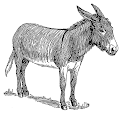I'm of the opinion that art does not - can not - die. Especially in today's climate of accelerated rediscovery and post modern appropriation nothing can stay burried for too long. Blondie and The Clash first married feuding bedfellows punk and disco with startling populist effect, only to be smothered by the strata of glam, new wave, hair-metal, grunge, emo, and hip-hop (among others) in quick succession. Less than twenty short years later bands with short memories and fans with short attention spans have strip mined through the layers and dusted off the more intact remains. The hip young things forcing toes to tap while fists pump and lips curl seem too easily reassembled from the bones of their idols - Arctic Monkeys (The Clash), Yeah Yeah Yeahs (Siouxsie & the Banshees), !!! (Gang of Four), The Gossip (Blondie).
Back in 2002 the quietly noisy Brooklyn band Liars staked an early claim on the wide open plane of a dance-punk renaissance with their debut LP They Threw Us All In a Trench and Stuck a Monument on Top. Their sound at the time was a little Sex Pistols and a lot hard to pin down. They offered no explanation for obtuse lyrics, there were no unsustainable frills to the sound, and no signs of the band relenting. The lingering sense after the last high hat was one of fierce electric heat, believable urgency and bigger things to come.
About the time the charts caught up and dance punk was the rule to the exception in the indie world, Liars served up They Were Wrong So We Drowned, a radical swerve off course plunging them dangerously into the woods of weird and difficult music to listen to let alone categorize. Just like that Liars went from being a band on the cutting edge of the next big thing in popular music to left field conceptual noise artists, the kind that never becomes popular. But oh the freedom of obscurity. With expectations shrugged and a few bridges burned leaving fair weather fans behind, the band expatriated to Berlin and began work on the music that became Drum's Not Dead.
While Berlin has recently been associated with all things dark and techno it has also been home to some serious and seeking minds; Friedrich "Only one man understood me, and he didn't understand me" Hegel, Arthur "The two enemies of happiness are pain and boredom" Schopenhauer, and Karl "I am not a Marxist" Marx. Lou Reed and Wim Wenders lived and worked there too. It's a city still rebuilding sixty years after the punishment it suffered at the end of WWII, a place that seems to invite introspection, deconstruction and expression on a grand and existential scale. In other words, it was the perfect place to start over and get weird.
While their increasingly hip dance punk successors seem content to scavenge the pop charts of an all too recent past, Liars have been holed up in Deutschland digging deeper in search of musical bedrock, the kind of primal experience linked directly to the seeds of human creativity.
Enter Drum, evoking pre-music as if excavated from within dense earth, amended, churned and made rich again. It is sticks, stones, skin and air; elemental, significant, and darkly, organically driven. The shift in the band’s sound that started with Drowned has gained momentum, simultaneously stripping itself down to its conceptual bare bones while building a mythology of origin complete with astral seas of crystal, a place called Mt. Heart Attack and a hero appropriately named Drum.
Nearly every sound heard on the album originates or closely references percusion. From their earliest days Liars have always been propelled by their drums. Julian Gross beat out substantial and caustic fuel ignited by Angus Andrew and Aaron Hemphill's scorching guitar / bass friction heat and accelerated by harsh bursts of Andrew's vocal oxygen. Drum is anchored by great big, well, drums played with ceremoneous rigor and left to echo in the spaces they carve out, creating architecture from atmosphere. Even the bass and, on the rare occassion when it surfaces, guitar sound as if they are played by with hammers or fists, pounded and left to resonate through the pulsing sine wave of teutonic rhythms.
The reductionism at work in the way the band uses its instruments has a reverse effect on their vocals, making the band's off-tune unison chanting the lone non-percussive element to the sound. And remarkably for three guys who would likely never claim to be great singers, it works. The raw vocal disharmony paired with lyrics referencing kidnap, murder, an epic journey and soulful reassurance matches the newly primal force beneath it all but also manages to float through each song like the wind instrument it truly is. Though it easily had the potential to slide into the murk, the album is not a sludgey or dull, rather it is voluminous, dark, and singular. I can easily recommend it to fans of the Microphones or Excepter (or Radiohead if you're ready to take a chance). I'll even go ahead and call a dead heat for album of the year (so far) with Band of Horses.

